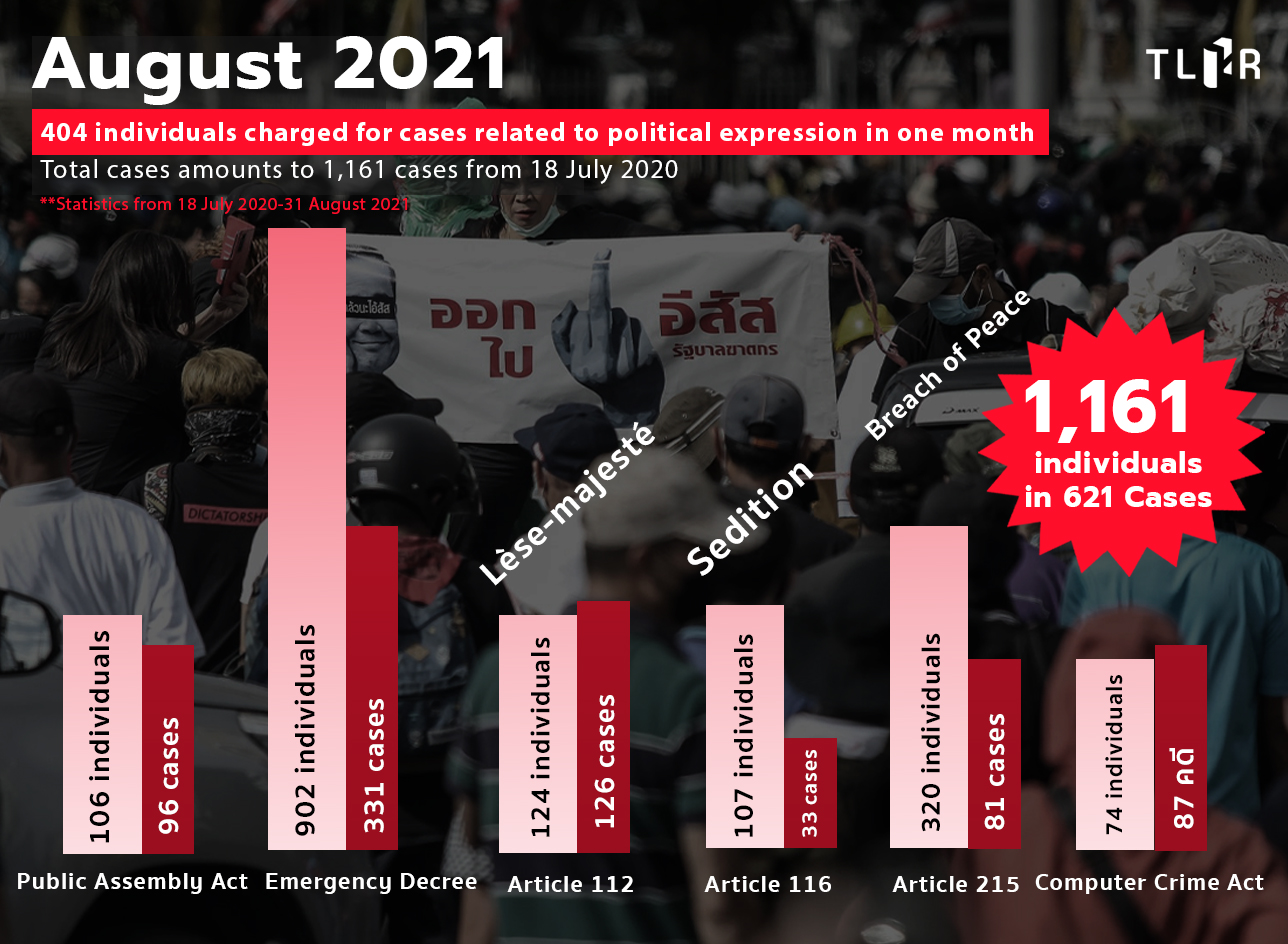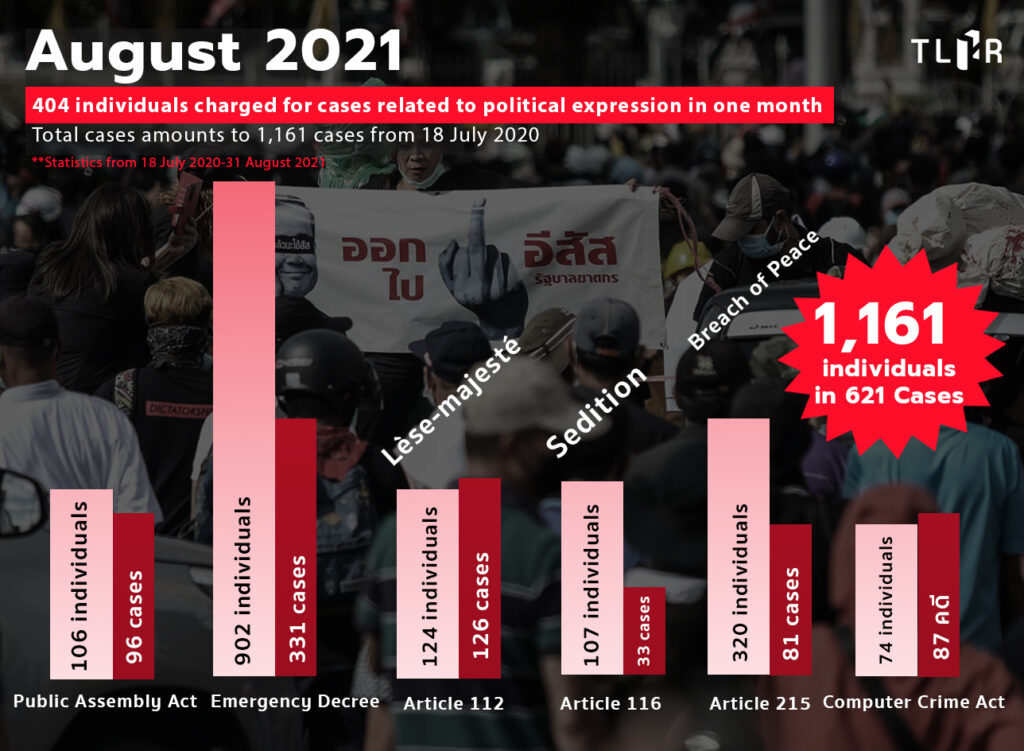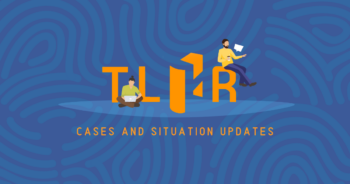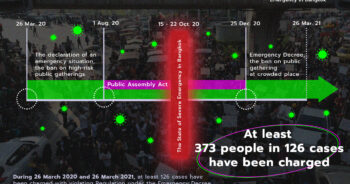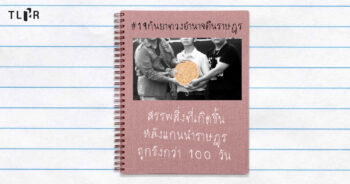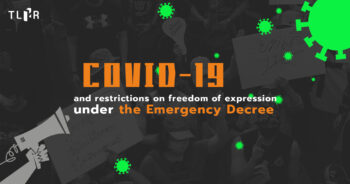Human rights situation amidst the Covid-19 pandemic
Amidst the renewed wave of Covid-19, the number of daily infection cases has exceeded 20,000 in the first half of August, before decreasing to below 10,000 in the second half. Nevertheless, the death toll of 190 per day is still regarded the highest in 2021.
The primary measures enacted by the Centre for COVID-19 Situation Administration (CCSA) since July until the nationwide extension of the Emergency Decree include working from home, curfew between 9 pm – 4 am for the dark red zone, and closure of restaurants, shopping malls, and various public areas. The state’s ineffective public health administration practice, coupled with the patchy vaccination program to curb the spread and accelerate the normalcy, have led to both broad online as well as offline public criticisms. As a result, political assemblies in various formats have continued to take place all over the country to call for the resignation of Gen Prayuth Chan-ocha and more effective inoculation effort.
In Bangkok, riot control police frequently follow a suppression and dispersion approach with a tendency to overuse force and weapons, which resulted in frequent confrontation between protestors and authorities. The incidents at the Din Daeng Triangle Junction in particular have led to accusation under the Emergency Decree, namely for activities deemed risky of transmission and breach of curfew.
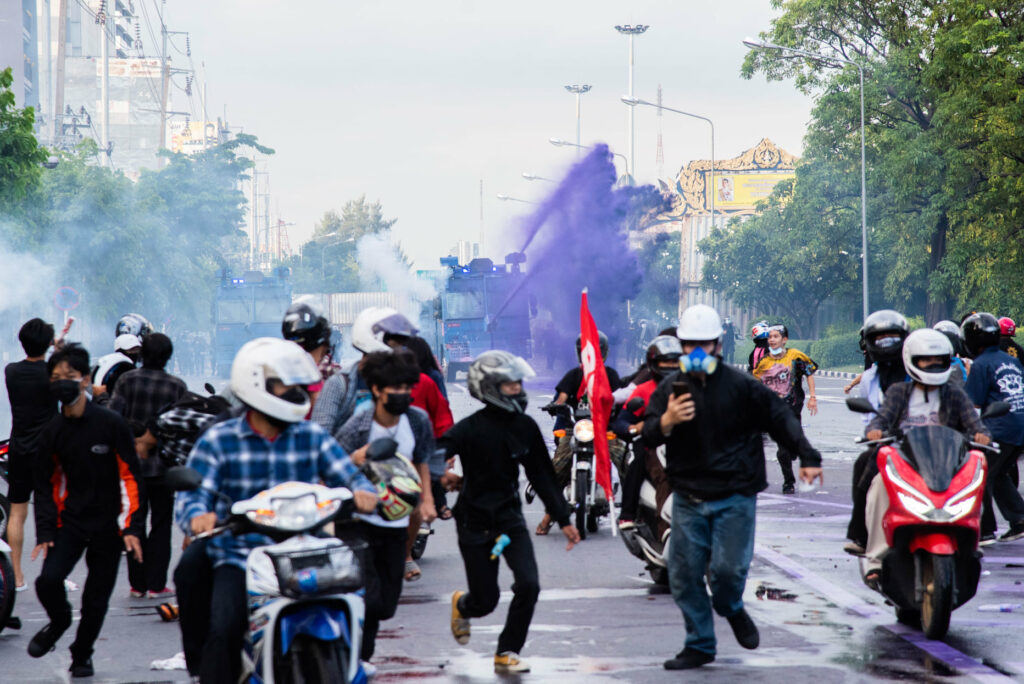
In other provinces, car mob is a preferred choice of method, where protestors can safely participate from within their personal vehicle while navigating through pre-determined areas in the city to show political stances. Yet, police officers have pressed charges against organizers and participants in many provinces. with the violation of the Emergency Decree for organizing activities with high risk of Covid-19.
The situation has led to a sharp increase in cases of violation of the Emergency Decree in August. That is, 353 new people have been accused with it, making the number of people charged with the Emergency Decree due to political participation totaling at least 902 individuals in 331 cases.
With regards to the dissemination of Covid-19 related information, the Government Gazette has published the revocation of the Regulation No. 29 issued under the Emergency Decree dated 29 July 2021 prohibiting the reporting of news or other media that causes fear or intends to spread misinformation about the emergency situation during the Covid-19 pandemic, and giving power to the prime minister to instruct the Office of the National Broadcasting and Telecommunication Commission (NBTC) to suspend the internet service for the public.
This move occurred after the Civil Court had issued a temporary protection order on 6 August 2021 suspending the said regulation following the submission of request by press members. The Court ruled that such a vague and broad regulation was an unnecessary restriction of people’s rights and liberties and that the prime minister did not have the power to issue regulations under the Emergency Decree allowing the NBTC to suspend internet. Therefore, the regulation was not lawful.
Meanwhile, the government still harasses people who express criticisms against the Covid-19 administration policy online, including Thanathorn Juangroongruangkit, leader of the Progressive Movement, who received a summon warrant containing section 112 charge from Phahonyothin Police Station from a complaint filed by the member of the Assisting Committee to the Ministers for the Prime Minister.
The media speculated that the charge was pertaining to his live video criticizing the government’s vaccine administration. In addition, Mr Anutin Charnvirakul, Minister of Public Health, has assigned a lawyer to file lawsuits of defamation and defamation by advertisement against Mr Nawat Itsaragrisil, television program host, and Mr Wiroj Lakkhanaadisorn, a member of parliament from the opposition Move Forward Party, for criticizing the executive decree limiting liability for healthcare workers in the treatment of Covid-19 patients.
Overall human rights situation
- More than 404 people were accused in a month, increasing the total number to at least 1,161
According to the TLHR monitoring, 1,161 people in 621 cases have faced lawsuits for their political participation and expression since the Free Youth rally on 18 July 2020 until the end of August 2021. Among them were 143 youths of under 18 years old, 259 women, and 38 members of the LGBTQ+ community.
Compared to the figures as of the end of July 2021, this month saw an increase of 404 individuals and 208 cases (only counting those who had not been charged before), including 92 youths. This means that the number of people accused in this month alone outnumbers that from the previous months combined.
Throughout the month, the TLHR found that at least 298 people were arrested for joining political assemblies. This number includes at least 15 individuals under 15 years old, at least 68 individuals between 15-18 years old, and 215 adults.
83 children and youth combined account for 27.8% of the total people arrested, indicating the significant role youths played in political expression, which led to a surge of the figures of youth facing legal harassment.
When only considering the Din Daeng Triangle Junction and nearby areas, where clashes between a group of protestors, later called “Talu-Gas”, and riot control police occurred almost daily since 7 August, at least 225 people, including at least 15 people under 15 years old and 62 between 15-18 years old, were arrested.
The TLHR found that police apprehended not only protestors accused of possessing fireworks, firecrackers, ping pong bombs, or pipe bombs, but also those passing through the protest site on the way home or happening to find themselves in the confrontation zone, members of unarmed groups, as well as drivers of amplifier vehicles (who were specifically targeted by authorities for prosecution and confiscation of amplifiers).
The accusations used include either curfew violation or violation of rule regarding assemblies deemed risky of transmission according to the Emergency Decree alone, or a combination of both taking part in fighting with the authorities as well as charges under the Penal Code including section 215, section 216, obstructing the authorities with force, or inflicting physical damages on the authorities. In many instances, it was found that the protestors were also subject to various forms of physical abuses by the authorities, including being shot with rubber bullets, trampled, and beaten with batons causing severe injuries.
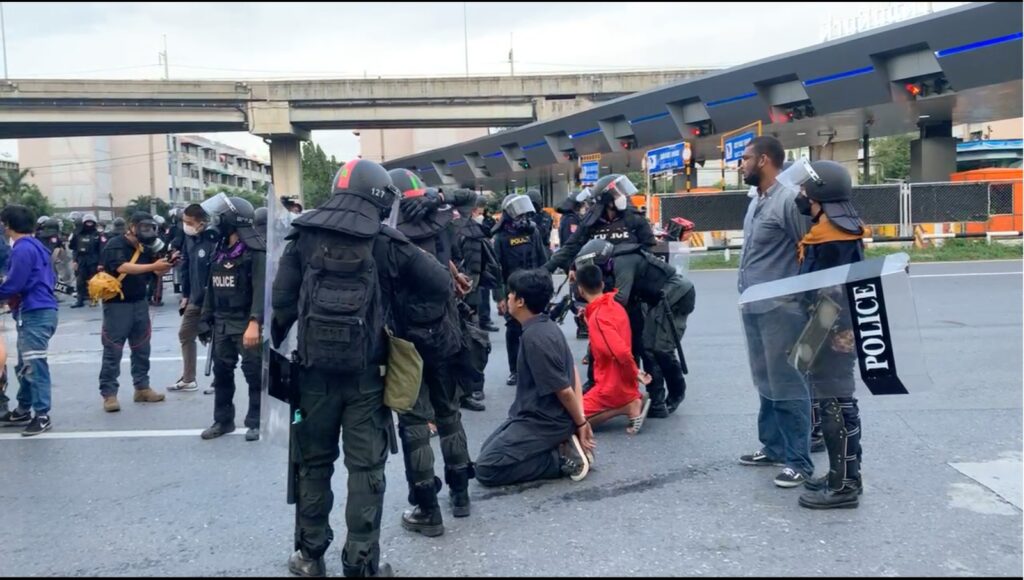
After the arrest, the protestors were initially brought to a designated place each day for interrogation, usually not the responsible police station. Later, they were also brought to the Narcotics Suppression Bureau situated within the Royal Thai Police Sports Club. Moreover, a large number of motorcycles belonging to both protestors and non-protestors were confiscated.
Generally, after the inquiry officers sought detention protestors from the Court the day following the arrest, the Court allowed bail for protestors with the amount of security set according to the protestor’s profile and the nature of charges, and required that the protestors refrain from joining assemblies that would cause disorder in the future.
Meanwhile, 11 Ratsadon leaders received arrest warrants in protest-related cases and were denied bail. While the bail for 4 of them were later granted, 7 others, including Parit Chiwarak, Panupong Jadnok, Promsorn Veerathamjaree, Thatchapong Kaedam, and Natchanont Pairoj, from the rally in front of Border Patrol Police Region 1 on 1 and 2 August 2021 calling for the release of Talu-Fah activists and citizens were still in detention.
On the other hand, Jatupat Boonpattararaksa, who was charged from the #30July rally, where he splashed paint at the office of the Bhumjaithai Party, and from the #3August rally, where he splashed paint on the sign of the Thung Song Hong Police Station, and Arnon Nampa, who was charged with section 112 for holding a monarchy-related speech at the Harry Potter-themed rally on 2 and 3 August 2021, were also denied bail.
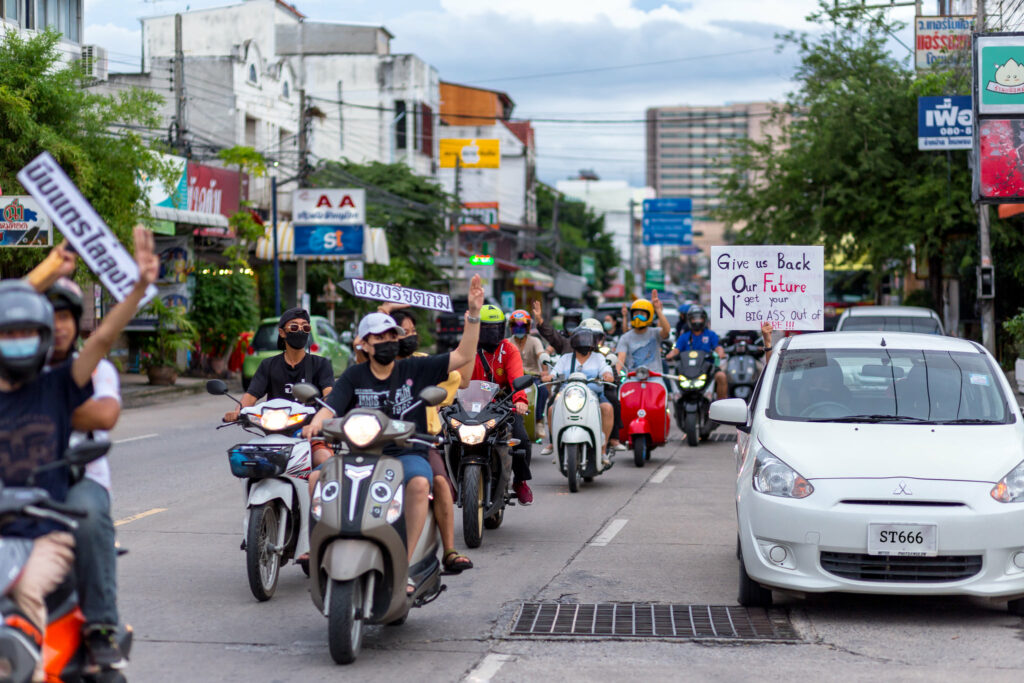
- Participants of the car mob activities in more than 29 provinces have faced charges, totaling more than 72 cases.
After Sombat Bunngam-anong had initiated the car mob as an alternative way to express political opinions and to call for the resignation of Gen Prayuth Chan-ocha on 3 July 2021, people in many provinces followed suit. In August, the police began to widely press charges against car mob participants in various locations. The TLHR has received reports that there were at least 72 cases from 29 provinces in August involving at least 186 people.
Among this number were 10 cases in which the police had already fined the protestors for using an amplifier or obstructing the traffic, rendering them final. Otherwise, in at least 62 other cases, the police accused the organizers or participants of violating the Emergency Decree by organizing or joining an assembly or activities that might trigger the spread of disease. In many cases, the accused had not left their personal vehicle or been the organizers.
In cases of peaceful assemblies with stages set up for speeches or rallies since June onwards, the police still continued to issue warrants summoning a large number of protesters to press charges with the Emergency Decree. Especially, the police from various police stations have been issuing summon warrants for almost all Talu-Fah assemblies since July.
- The number of section 112 cases has increased by 15 from speeches, expression, and texts.
In August, at least 11 additional people in 15 cases have been accused of section 112 last month. Consequently, at least 124 people in 126 cases have been accused of Lèse-majesté in total since the renewed use in November 2020.
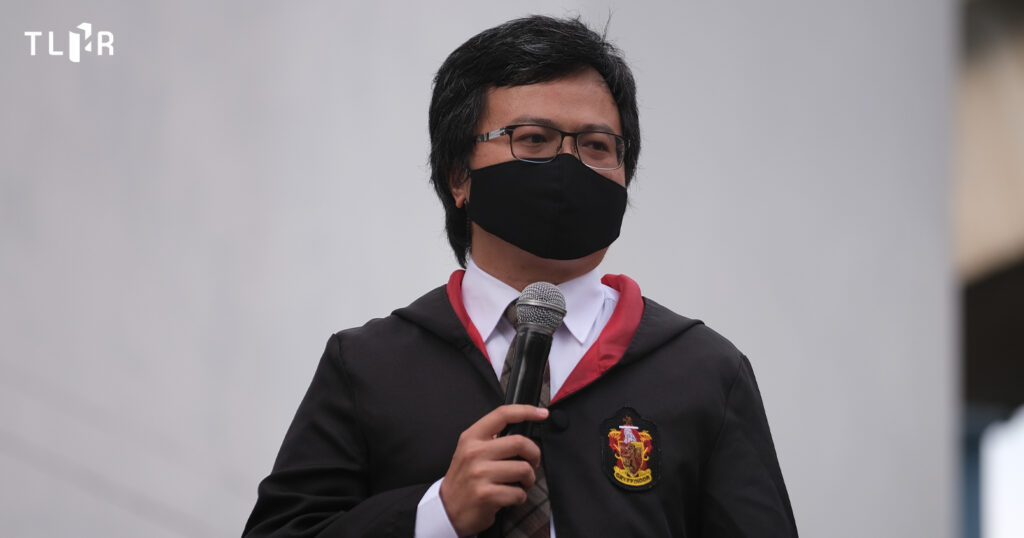
One of the prominent cases in the past month was that of Arnon Nampa, who made a speech on the 1st anniversary of the Harry Potter-themed Rally on 3 August 2021. The police issued an arrest warrant with section 112 charge, after Arnon had surrendered himself. The police then sought his detention from the Court. Since then, Arnon has never been allowed bail.
Chiang Mai has also seen several section 112 cases from car mob activities, including Thanathorn Wittayabenjang, a student leader of the Wilar Party who has been accused of his speech during the car mob on 15 August, Thanakorn, who has been accused of writing texts on fabrics and papers to be fixed on the cars during the car mob on 1 August, and “Kate”, a student who has been accused of displaying signs at the same car mob activity.
Lastly, as part of the ongoing cases related to online expression, Akkapon ‘Beam’ went to hear the charge of criticizing the King Rama IX, after Nangnoi Assawakittikorn, chair of the Legal Aid Center for Victims of Online Bullies, had filed a complaint with the TCSD since early January 2021. The police from the Rattanathibet Police Station also pressed section 112 charges against people who were accused of removing the King Rama X’s portrait in front of the village in addition to charge theft at night earlier.
- Authorities relentlessly monitor and harass people participating in protests and sharing posts.
In August, police of various divisions approached activists and citizens at their houses due to political involvement or monarchy-related posts. The TLHR has received reports of such harassment in at least 27 instances.
Activists organizing the car mob activities or participating citizens in several locations were visited by police officers at their houses, and were warned against attending future activities. For example, in Kanchanaburi province, the leaders of “Seri Kan for Democracy” group were approached by at least 25 authorities, including police, soldiers, and administrative sector, at home, and asked them to refrain from organizing the car mob activity in the area.
In Nakhon Ratchasima, a female activist noted that several vehicles belonging to plain-clothed men were spotted around her village throughout the morning of 21 August 2021, after the car mob activity had been announced in the afternoon. In addition, authorities also inquired about her from the village’s market owner.
In Pathum Thani province, two plain-clothed officers monitored a citizen, who owned a Buddha figure shop, after he had attended car mob activities in Bangkok twice. They took pictures of him and attempted to spy on his routine from around the house.
Regarding expression on the topic of monarchy, a female factory worker in Samut Sakhon province was visited by 5 police officers at her workplace, claiming that they had been instructed by the “superior” to ask her to delete her Facebook post containing “royal criticisms. However, the officers did not clarify which post(s) were referred to.
